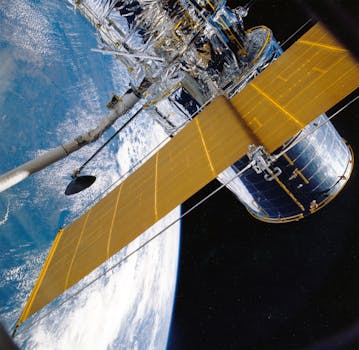
The Future of Satellites: Revolutionizing Global Connectivity
The future of satellites is poised to revolutionize global connectivity, with advancements in space technology and innovative applications. Satellites have been a crucial part of modern communication, navigation, and weather forecasting for decades. However, the next generation of satellites is expected to play an even more significant role in shaping the future of global connectivity. In this article, we will explore the future of satellites and their potential impact on various industries.
Advancements in Space Technology
Recent advancements in space technology have made it possible to launch smaller, more efficient, and cost-effective satellites. The development of reusable rockets, such as those designed by SpaceX, has significantly reduced the cost of launching satellites into orbit. This has led to an increase in the number of satellites being launched, with many more planned for the future. The use of advanced materials and technologies, such as 3D printing and artificial intelligence, is also expected to improve the performance and lifespan of satellites.
The future of satellites will also see the emergence of new types of satellites, such as nano-satellites and micro-satellites. These small satellites are designed to be smaller, lighter, and more cost-effective than traditional satellites. They will be used for a variety of applications, including Earth observation, communication, and navigation. The use of satellite constellations, which involve a large number of satellites working together to provide global coverage, is also expected to become more prevalent.
Innovative Applications
The future of satellites will also see innovative applications in various industries. One of the most significant applications will be in the provision of global internet connectivity. Companies such as SpaceX and Amazon are planning to launch constellations of satellites to provide high-speed internet access to remote and underserved areas. This will have a significant impact on global connectivity, enabling people in remote areas to access the internet and communicate with others around the world.
Satellites will also play a crucial role in the development of the Internet of Things (IoT). The use of satellites to connect devices and sensors will enable real-time monitoring and tracking of assets, improving efficiency and productivity in industries such as logistics, agriculture, and healthcare. The use of satellites in navigation and mapping will also become more prevalent, with the development of more accurate and reliable positioning systems.
Challenges and Opportunities
Despite the many opportunities presented by the future of satellites, there are also challenges that need to be addressed. One of the significant challenges is the issue of space debris, which poses a risk to the safety of satellites and other spacecraft. The development of sustainable and responsible space practices will be essential to mitigate this risk.
The future of satellites also presents opportunities for international cooperation and collaboration. The development of global satellite systems will require cooperation between countries and organizations, promoting peaceful use of space and advancing our understanding of the universe. The future of satellites will also create new opportunities for education and research, enabling scientists and engineers to study the Earth and space in greater detail.
Conclusion
In conclusion, the future of satellites is poised to revolutionize global connectivity, with advancements in space technology and innovative applications. The development of smaller, more efficient, and cost-effective satellites will enable the provision of global internet connectivity, improve navigation and mapping, and enhance the Internet of Things. However, the future of satellites also presents challenges that need to be addressed, including the issue of space debris and the need for international cooperation. As we look to the future, it is essential to promote sustainable and responsible space practices, advancing our understanding of the universe and improving life on Earth.







